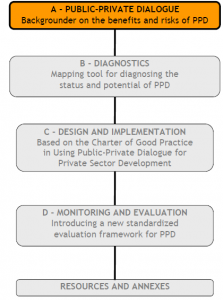Why a handbook on public-private dialogue?
In recent years there has been growing interest in the potential for dialogue between the public and private sectors to promote the right conditions for private sector development and poverty reduction.
There is an emerging body of case studies and synthesis research papers on techniques for promoting
successful dialogue, including major studies by the World Bank, DFID, and OECD Development Centre. Practitioners have asked this knowledge to be collated and presented in an accessible and
comprehensible way. That is the purpose of this handbook.
Who is this handbook for?
This handbook is for anyone who is interested in promoting public-private dialogue (PPD) as a tool for improving the conditions for the private sector. This includes donor agencies, governments,
private sector representative associations, and individual businesspeople.
Is there anything else which is a must-read?
Yes, there are several valuable case studies and research papers produced on the topic, all referenced at the end of this Handbook. Of particular interest is a paper that should be read in priority so as to complement this Handbook. “Consultation with Stakeholders in the Shaping of National and Regional Policies Affecting Small Business” published in 2005 by the Enterprise and Industry Directorate General of the European Commission, reviews current PPD activities and best practices in the 25 European Union (EU) member countries, and as such is an invaluable document to consult. It is available online on www.publicprivatedialogue.org/papers.
How did this handbook come about?
In February 2006, the World Bank, DFID, and OECD Development Centre co-organized the first International Workshop on Public Private Dialogue, held in Paris and attended by 100 stakeholders
from 30 countries.
Participants at the workshop drew up the Charter of Good Practice in using Public Private Dialogue for Private Sector Development
This handbook is an output of the workshop. It takes the principles of the Charter as its base and expands on them with practical advice and recommendations.
Where can I find further information?
Also an output of the Paris workshop, www.publicprivatedialogue.org is a one-stop shop of
knowledge and advice on public-private dialogue. There you will find research papers, case studies, links, and further useful tools for practitioners.

